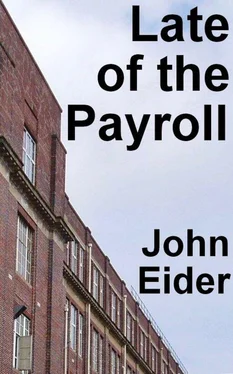John Eider - Late of the Payroll
Здесь есть возможность читать онлайн «John Eider - Late of the Payroll» весь текст электронной книги совершенно бесплатно (целиком полную версию без сокращений). В некоторых случаях можно слушать аудио, скачать через торрент в формате fb2 и присутствует краткое содержание. Жанр: Полицейский детектив, на английском языке. Описание произведения, (предисловие) а так же отзывы посетителей доступны на портале библиотеки ЛибКат.
- Название:Late of the Payroll
- Автор:
- Жанр:
- Год:неизвестен
- ISBN:нет данных
- Рейтинг книги:4 / 5. Голосов: 1
-
Избранное:Добавить в избранное
- Отзывы:
-
Ваша оценка:
- 80
- 1
- 2
- 3
- 4
- 5
Late of the Payroll: краткое содержание, описание и аннотация
Предлагаем к чтению аннотацию, описание, краткое содержание или предисловие (зависит от того, что написал сам автор книги «Late of the Payroll»). Если вы не нашли необходимую информацию о книге — напишите в комментариях, мы постараемся отыскать её.
Late of the Payroll — читать онлайн бесплатно полную книгу (весь текст) целиком
Ниже представлен текст книги, разбитый по страницам. Система сохранения места последней прочитанной страницы, позволяет с удобством читать онлайн бесплатно книгу «Late of the Payroll», без необходимости каждый раз заново искать на чём Вы остановились. Поставьте закладку, и сможете в любой момент перейти на страницу, на которой закончили чтение.
Интервал:
Закладка:
Grey noticed the manager wince at this, the consultant playing fast and loose with the information he had been gracious enough to release, bringing a physical reaction with the thought of another set of uncleared eyes gobbling up information from their closely guarded, password-protected computer screens.
‘You can see, Inspector,’ Keith Pitt instructed while the officer craned to look over his shoulder, ‘certain bills recurring from month to month, the amounts virtually the same, and funds released for their payment at the same dates and times. These will I expect turn out to be for materials, electricity and utilities, fixed overheads.
‘And set against that, although it takes a little more looking, you can trace the balance month on month after each of these big bills leaves the account. And I see, Inspector, that though the costs remain the same, the money left at the end of each month — or rather, what is left of the overdraft — is ever less. Not a dramatic fall, but a consistently one. There is a pattern.’
‘So,’ Grey dared surmise, ‘this is a situation building up over many months?’
‘Oh yes, at least as far back as Mr Foy has kindly permitted us to look. I wonder, Inspector, were you expecting something rather more dramatic?’
Grey wasn’t sure what he expected, but caught the drift. ‘Foul play you mean? I had no reason to suspect. Did you?’
‘Well, you’d be surprised. I’ve seen some dodgy dealing in my time.’
Mr Foy grimaced again, as if an attack on people who may have been his customers was an attack on him.
‘But in this case,’ continued Keith Pitt less dramatically, ‘there has been no cataclysmic failing of the firm’s finances, nor anything illicit as far as I can see — simply a company losing a bit more money each month; and at a remarkably consistent rate too, although that is perhaps not surprising when their earnings come from long-term contracts.
‘But,’ he concluded with a flourish, ‘you could have plotted this decline on a flipchart many months ago.’
Grey’s thoughts, though not yet his gaze, turned directly to the man almost cowering at the back of the room, unsure as to what degree Keith Pitt was alluding that it was Mr Foy who should have spotted this pattern. After all, weren’t Aubrey’s one of the biggest accounts on his books? Didn’t he have a responsibility here?
‘So,’ Grey wanted the picture clear in his head with all its implications,’ if the finances were heading south as such a regular rate, then Aubrey, if not also Thomas Long, would have known this was coming this month?’
‘More likely Aubrey than Long, depending on what his role entails, how much responsibility he is given. But yes,’ continued Keith Pitt, ‘with the rate of decline so shallow, and payroll being a variable cost at the best of times — what with temporary staff, overtime, family leave, other absences — then they may have hoped for a couple of more months yet before things became critical.’
‘Or,’ Grey speculated aloud, the look of approval in Pitt’s eyes suggesting he was on the right track, ‘Aubrey may have been counting his lucky stars that this hadn’t happened already?’
‘Quite right, Inspector. The analogy would be of an aircraft looping ever lower over a mountaintop, itself covered in an ever-changing thickness of snow. You couldn’t say which swoop would bring calamity, only that it became more certain each time.’
Grey could not put it off any longer. However badly he felt for the bank manger — who was suffering something terrible at the hands of strangers within his own office, their unspoken judgement of his handing of the firm’s affairs implied in every portentous word — there was information needed, and only he could give it,
‘Mr Foy,’ Grey turned to him. ‘I wonder, had you spotted this situation developing? And did you speak to anyone at Aubrey’s office about it? Did Thomas Long know how bad it was?’
‘I can assure you,’ the bank manager quivered with indignation, ‘that any conversations I had with Mr Aubrey or his staff were of the highest confidentiality.’
‘But, we don’t care about the accounts, only if Thomas Long…’
‘Sir, I must insist, I can tell you no more presently!’
These weren’t merely words to end a conversation, but a psychological point in a man’s life. Realising Mr Foy had slipped into denial, and that he wasn’t going to get anywhere with him this evening, Grey tried another tack, turning from the man whose office this was to the one who now held the authority,
‘How is this going to work, Mr Pitt?’
The financial consultant spoke quickly and with experience, ‘It could go several ways, Inspector. My favoured solution, for the company’s sake, is to go through these monthly bills and find a friendly creditor, who if we encourage them to appeal to the court to appoint an Administrator, might fend off less happier creditors who want to appoint a Receiver. And none of us want that.’
‘You don’t have the authority,’ snapped the bank manager.
‘Then find me Aubrey, or another director of the firm,’ Pitt calmly retorted. ‘Tell them to appoint the Administrator. Mr Foy, there are only secretaries left in that office!’
‘Does your instruction by Mrs Marsh’s stretch to this?’ asked Grey.
‘We’ll soon find out. I’ll speak to her tomorrow, we’ll look into it then.’
Upon hearing these words, he sensed that was that for today, ‘All right then, thank you Mr Foy. I’ll let you get home now. Come on fellows, we’ve kept our man long enough. I presume, Mr Foy, you will be available to contact here tomorrow morning?’
The man nodded meekly, as Grey and the others (for young Gareth had been listening with fascination) filed out quietly from the room. They were almost at the stairs, waiting for their unhappy host to follow them down, to unbolt the door and release them to the empty shopping street, when he called from behind them in a voice as self-defensive as it was explanatory,
‘I told Alex, over and over. I told him that something had to be done. He would laugh off my fears, telling me there was something in the pipeline, money coming from somewhere, new business partners. And then each month — nothing. There comes a point, gentlemen, with even the most valued and loyal customer, where a bank manager has to consider…’
‘Foreclosing?’ Keith Pitt completed the sentence, the word being too obscene for Mr Foy to contemplate leaving his lips, the very antithesis of everything a bank manager tries to achieve in his professional life. He continued,
‘For Aubrey Electricals to have… gone that way, and at my hand! And with it meaning so much to the town! How could I have walked along the street, looked people in the eye? It would have represented my professional failure as much as Alex’s.
‘“It will be fine, it will be fine,” Alex kept telling me. “I’m working on it as we speak.”’ He shook his head, ‘He and his father have been such good customers, for as long as I have been at the branch. And he was a friend too, and a Clubman, and I’m sure you appreciate what that means, gentlemen.
Gentlemen, in plural? Grey looked at Keith Pitt, who answered his querying look,
‘I’m on the list for consideration, hoping to make it in the autumn selection.’
‘A mere formality, Mr Pitt,’ confirmed Foy. ‘I am on the panel. I suppose I shouldn’t really be talking about it outside the Club,’ he continued, ‘but then, so many of our secrets have been thrown out on the line for all to hear tonight, so what’s the harm of one more?’
Chatting over Club business seemed to have cheered the bank manager up; and it struck Grey he uttered that last line with something approaching sarcastic irony. The cheek! But it also struck him that there really was nothing more to be said, that the man’s tragedy was only matched by his reserve, and how boring would Macbeth had been if told with understatement? Either way, young Gareth was enjoying the exchanges like a boy being allowed to stay up and listen in on adult conversation.
Читать дальшеИнтервал:
Закладка:
Похожие книги на «Late of the Payroll»
Представляем Вашему вниманию похожие книги на «Late of the Payroll» списком для выбора. Мы отобрали схожую по названию и смыслу литературу в надежде предоставить читателям больше вариантов отыскать новые, интересные, ещё непрочитанные произведения.
Обсуждение, отзывы о книге «Late of the Payroll» и просто собственные мнения читателей. Оставьте ваши комментарии, напишите, что Вы думаете о произведении, его смысле или главных героях. Укажите что конкретно понравилось, а что нет, и почему Вы так считаете.





![John Stieber - Against the Odds - Survival on the Russian Front 1944-1945 [2nd Edition]](/books/405234/john-stieber-against-the-odds-survival-on-the-russian-front-1944-1945-2nd-edition-thumb.webp)






